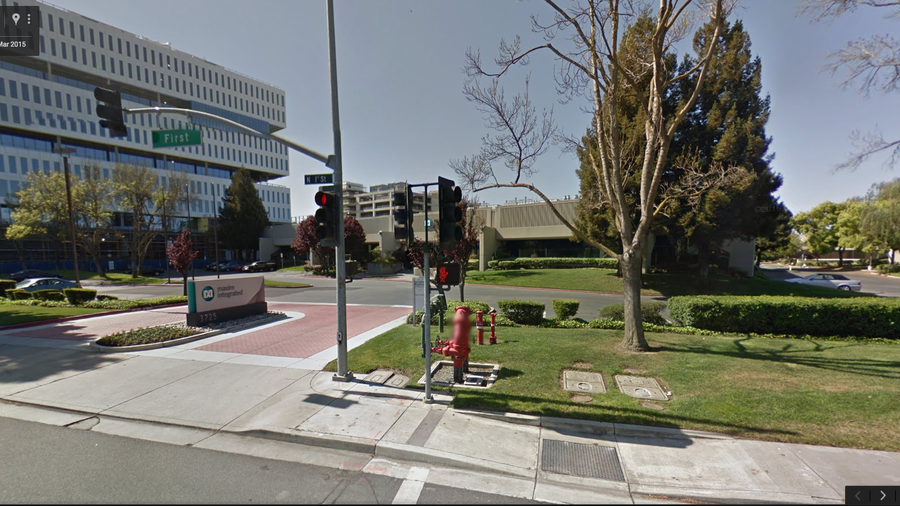Apple Inc. has snapped up a former chip fab in North San Jose, the latest real estate play for the Cupertino-based tech juggernaut after a breathtaking year for the company's expansion in Silicon Valley.
Apple last week paid $18.2 million for the 70,000 square foot building at 3725 N. First St., public records show. The purchase is notable for the real estate's former use: It was a manufacturing facility for semiconductor company Maxim Integrated Products, which was also the seller. I reported in July that Maxim was closing the plant and would be putting it on the market.
Also of interest: The deal makes Apple neighbors with Samsung Semiconductor, which earlier this year opened a huge new campus at North First Street and Tasman Drive. Samsung remains a key Apple supplier, but is also a major competitor and foe in a high-profile patent lawsuit.
It's unclear what Apple will use the facility for, but marketing material from the listing agent, ATREG, says: "Well suited for prototype, pilot, and low-volume manufacturing, this facility is capable of producing a wide array of products at multiple technology nodes ranging from 600nm to 90nm, with the bulk of production from 350nm to 180nm." The facility also "offers a complete tool line consisting of 197 well-maintained front-end tools from such OEMs as AMAT, Hitachi, Novellus, LAM, TEL, KLA, and ASML," the marketing material states.
Get A.M. business scoops. Subscribe to SVBJ's free morning email newsletter.
Experts said on Monday that the pickup probably does not signal a big push into production chip manufacturing for Apple, but does suggest the company needs more "heavy R&D" space as it continues to expand into new products and markets.
"It's pretty small for a fab," said Dean Freeman, research VP at Gartner, where he leads the Internet of Things Center of Excellence. "The only thing I can think that they would be doing is potentially be saying, 'OK, we need to do some prototyping in some way or form.' Or they want a clean-room space to do some tweaky development. This isn’t big enough to do anything (production-wise)."
Brian Blau, who covers Apple for Gartner, said Apple may be looking to expand its product-development, pre-manufacturing and prototyping capabilities. But he said it's difficult to tie an expansion play like this to a specific product focus.
"Apple is a huge company, and we know Apple is going to be investing in a lot of products over the next 20 years," Blau said. "These kind of investments I think are very long term."
The pickup illustrates the diversity of Apple's real estate requirements. While much attention has focused on the high-end office space Apple is leasing and building (such as the Landbank Central & Wolfe campus in Sunnyvale, and the Apple Campus 2 under construction in Cupertino), Apple is also ravenous for industrial and R&D space — flexible buildings that can handle power-hungry heavy machinery and lab facilities. Other recent Apple deals in this vein include 5440 Patrick Henry Drive, a 185,000-square-foot former Abbott Labs R&D facility in Santa Clara; and 335 Brokaw Road, a 151,000-square-foot former FedEx distribution center, also in Santa Clara.
The Maxim deal is another dot on the map for Apple in San Jose. About 2.5 miles down North First Street, Apple has assembled an 86-acre parcel where it could develop millions of square feet of new office, industrial or R&D space. Apple is working with the city of San Jose on a development agreement for the site, but has not actually proposed a project for it.
Maxim acquired the facility back in 1997 from Samsung, but Maxim closed the facility after the company pulled out of the consumer-focused MEMS business. MEMS stands for "micro electronic mechanical systems," which refers to systems that combine mechanical and electrical components and are fabricated using semiconductor fabrication techniques.
Asked for comment, Apple provided an emailed statement that reads: "As we continue to grow, we're planning to build R&D facilities and some additional office space in San Jose. The property isn't far from the future home of our new campus and we're looking forward to expanding our presence in the Bay Area.”
